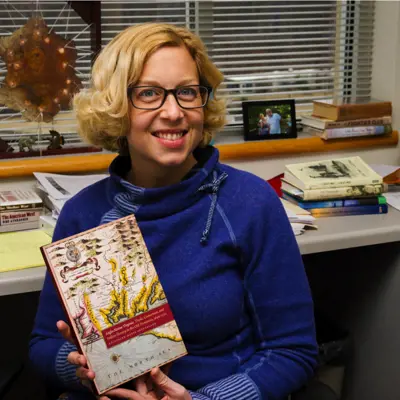
On the bookshelf: Shefveland explores plantation slavery and Anglo-Indian relationships
January 30, 2017
The publication of a book is a monumental achievement. The "On the bookshelf" series spotlights our USI faculty and staff writers and celebrates their hard work. If you've had a book published and would like to be considered for an "On the bookshelf" feature, use our Faculty/Staff Achievement form. If you've had other works published or received an award, you can use the same form to be recognized in USI Today's Faculty/Staff Achievement section.
Since she was a child, Dr. Kristalyn Shefveland, associate professor of history, wanted to be a storyteller. While she has had numerous journal articles and book chapters published, she has now completed the 10-year quest of having a book published. In Anglo-Native Virginia: Trade, Conversion, and Indian Slavery in the Old Dominion, 1646-1722, Shefveland explores these often under-examined years and the Anglo-Indian relationships and plantation slavery in colonial Virginia.
"I was particularly interested in this specific time period (1646-1722) because it's sort of glossed over in the larger Virginia history," Shefveland said. "This is a crucial moment between settler colonists and indigenous peoples. I'm looking at this paradigm of trying to recreate a Spanish tributary system in Virginia."
Historical figures closely followed in the book, are William Byrd I and his son William Byrd II, English planters and traders, who capitalized not only on exporting tobacco and other goods, but also the export of Native American slaves and the import of African slaves. Byrd II, whose secret diary revealed him not only to be a proto-capitalist, but a notorious philanderer.
Cockacoeske, leader of the matrilineal Pamunkey tribe, serves as another prominent figure and example of how Native Americans fought to reconsolidate their power. While in a relationship with a prominent English colonel, John West, she gave birth to a son, and the English colonists expected this son would go on to power through the patrilineal lineage of his father, but the reigns were ultimately passed matrilineally to her niece.
"The Pamunkey tribe is one of the indigenous tribes still active and present in Virginia today and are on the exact same land they've been on since the 1640's," Shefveland said. "They maintain fishing rights on the land and are still a powerful force in the river tributaries."
The book was developed from Shefveland's dissertation at the University of Mississippi, and took 10 years to complete and publish. "I joke with my daughter that the book is her twin because I was pregnant with her when I started the prospectus for the project, so they've grown up together," she said.
Shefveland has already begun work on a new book tentatively titled Old Florida and will present on her new research at the Pocahontas and After Conference at the Institute for Historical Research in London this March.
Anglo-Native Virginia: Trade, Conversion, and Indian Slavery in the Old Dominion, 1646-1722 was published by the University of Georgia Press as part of the Early American Places series and is available for purchase on Amazon.